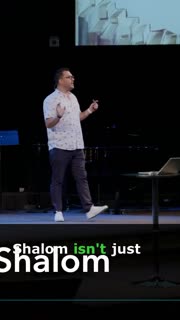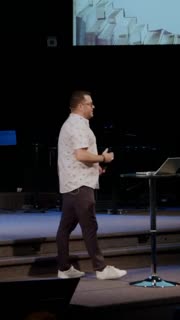Seeking Wholeness: The Journey to Shalom
Summary
### Summary
Good morning, everyone. Today, we began with a formal announcement regarding the nominating committee for the Board of Elders at Rexdale Alliance Church. If you have recommendations, please submit them by the deadline. Following that, I gave several shout-outs to members of our congregation, celebrating their achievements and contributions.
As we transitioned into the main message, I shared my reflections on the concept of wholeness or completeness, often referred to as "shalom." Shalom is not just the absence of conflict but the presence of goodness, reconciliation, and restoration. We naturally seek this completeness in various aspects of our lives, whether it's finishing a project or mending a broken relationship.
We then delved into Luke 15, examining the parables of the lost sheep, the lost coin, and the prodigal son. These stories are often interpreted as lessons on sin, repentance, and forgiveness. However, I encouraged us to look at them from a different perspective, imagining how the original listeners might have heard them.
The parable of the lost sheep emphasizes the importance of recognizing when something is missing and taking action to restore it. The lost coin parable adds a layer of personal responsibility, urging us to acknowledge our role in losing what is valuable. The story of the prodigal son, however, takes a different turn. It highlights not just the younger son's return but also the older son's feelings of neglect and resentment. This story challenges us to consider the complexities of family dynamics and the difficulties in achieving true reconciliation.
The father in the parable represents God, who seeks to restore wholeness in the family. Yet, unlike sheep or coins, children have free will and emotional needs, making the process of reconciliation more complicated. The father's actions show us that the real challenge is not just welcoming the wayward back but also recognizing and addressing the hidden hurts within our own households.
In conclusion, these parables teach us the importance of seeking out what is lost and celebrating when it is found. Whether it's a family member, a friend, or a part of ourselves, the pursuit of shalom is a journey worth undertaking. As we go about our week, let's take inventory of our lives and relationships, seeking to restore what is missing and celebrating the wholeness we achieve.
### Key Takeaways
1. The Pursuit of Shalom: Shalom is more than just peace; it is the presence of goodness, reconciliation, and restoration. We naturally seek this completeness in various aspects of our lives, whether it's finishing a project or mending a broken relationship. This pursuit is a reflection of our innate desire for wholeness. [35:11]
2. Recognizing What is Lost: The parables of the lost sheep and the lost coin teach us the importance of recognizing when something valuable is missing in our lives. Whether it's a relationship, a personal goal, or a spiritual connection, identifying the loss is the first step towards restoration. [46:33]
3. Personal Responsibility in Restoration: The parable of the lost coin adds a layer of personal responsibility. The woman acknowledges her role in losing the coin and takes action to find it. This teaches us to own our part in any loss we experience and to actively seek restoration. [47:03]
4. Complexities of Family Dynamics: The story of the prodigal son highlights the complexities of family dynamics. It challenges us to consider not just the wayward child's return but also the feelings of neglect and resentment that may exist within the family. True reconciliation requires addressing these hidden hurts. [58:22]
5. God's Role in Reconciliation: The father in the parable represents God, who seeks to restore wholeness in the family. Unlike sheep or coins, children have free will and emotional needs, making the process of reconciliation more complicated. The father's actions show us that the real challenge is not just welcoming the wayward back but also recognizing and addressing the hidden hurts within our own households. [57:17]
### YouTube Chapters
[0:00] - Welcome
[31:41] - Announcement: Board of Elders Nominations
[32:19] - Shout-Outs to Congregation Members
[34:25] - Introduction to the Concept of Shalom
[35:11] - The Pursuit of Wholeness
[36:57] - Introduction to the Parables
[37:34] - The Lost Sheep
[46:33] - The Lost Coin
[47:03] - Personal Responsibility in Restoration
[48:32] - The Prodigal Son
[58:22] - The Older Brother's Perspective
[01:02:34] - The Father's Role in Reconciliation
[01:07:56] - Practical Applications
[01:13:15] - Seek and Celebrate Shalom
[01:16:27] - Closing Prayer and Invitation for Prayer Partners
Study Guide
### Bible Reading
1. Luke 15:1-32 - The Parables of the Lost Sheep, the Lost Coin, and the Prodigal Son
### Observation Questions
1. In the parable of the lost sheep, what actions does the shepherd take when he realizes one sheep is missing? ([40:16])
2. How does the woman in the parable of the lost coin respond when she finds her lost coin? ([46:33])
3. What are the key differences in the reactions of the father and the older brother when the prodigal son returns? ([42:03])
4. According to the sermon, what is the significance of the father's actions towards both of his sons in the parable of the prodigal son? ([57:17])
### Interpretation Questions
1. What does the concept of "shalom" mean in the context of the sermon, and how does it relate to the parables in Luke 15? ([35:11])
2. How does the sermon suggest we should view the parables of the lost sheep and the lost coin in terms of personal responsibility and restoration? ([47:03])
3. In what ways does the story of the prodigal son challenge our understanding of family dynamics and reconciliation? ([58:22])
4. How does the father's role in the parable of the prodigal son illustrate God's approach to reconciliation and wholeness? ([57:17])
### Application Questions
1. Reflect on a time when you felt something was missing in your life. How did you pursue "shalom" or wholeness in that situation? ([35:11])
2. Identify a relationship in your life that may need restoration. What steps can you take to acknowledge your role and seek reconciliation? ([47:03])
3. Consider the complexities of your own family dynamics. How can you address hidden hurts and work towards true reconciliation within your family? ([58:22])
4. How can you emulate the father's actions in the parable by recognizing and addressing the emotional needs of those around you? ([57:17])
5. Think about someone in your life who may feel neglected or overlooked. What practical steps can you take this week to reach out and make them feel valued? ([58:22])
6. Reflect on the idea of celebrating when something lost is found. How can you incorporate this practice of celebration into your daily life, especially in your relationships? ([46:33])
7. How can you take inventory of your life and relationships this week to identify what might be missing and take steps towards restoration and wholeness? ([35:11])
Devotional
Day 1: The Pursuit of Shalom
Shalom is more than just peace; it is the presence of goodness, reconciliation, and restoration. We naturally seek this completeness in various aspects of our lives, whether it's finishing a project or mending a broken relationship. This pursuit is a reflection of our innate desire for wholeness. Shalom encompasses not just the absence of conflict but the active presence of all that is good and right. It is a state of being where everything is as it should be, reflecting God's original design for creation.
In our daily lives, we often find ourselves yearning for this sense of completeness. Whether it's in our work, our relationships, or our spiritual journey, the pursuit of shalom is a journey worth undertaking. As we go about our week, let's take inventory of our lives and relationships, seeking to restore what is missing and celebrating the wholeness we achieve. [35:11]
Isaiah 32:17 (ESV): "And the effect of righteousness will be peace, and the result of righteousness, quietness and trust forever."
Reflection: What is one area of your life where you feel a lack of shalom? How can you actively seek to restore goodness and wholeness in that area this week?
Day 2: Recognizing What is Lost
The parables of the lost sheep and the lost coin teach us the importance of recognizing when something valuable is missing in our lives. Whether it's a relationship, a personal goal, or a spiritual connection, identifying the loss is the first step towards restoration. These parables remind us that we must be vigilant and aware of the things that matter most to us.
In the story of the lost sheep, the shepherd leaves the ninety-nine to find the one that is lost, showing the value of each individual. Similarly, the woman who loses a coin lights a lamp and sweeps the house until she finds it, demonstrating the effort required to recover what is lost. These actions highlight the importance of recognizing and addressing the gaps in our lives. [46:33]
Luke 15:8-9 (ESV): "Or what woman, having ten silver coins, if she loses one coin, does not light a lamp and sweep the house and seek diligently until she finds it? And when she has found it, she calls together her friends and neighbors, saying, ‘Rejoice with me, for I have found the coin that I had lost.’"
Reflection: Is there something or someone valuable in your life that you have lost touch with? What steps can you take today to begin the process of restoration?
Day 3: Personal Responsibility in Restoration
The parable of the lost coin adds a layer of personal responsibility. The woman acknowledges her role in losing the coin and takes action to find it. This teaches us to own our part in any loss we experience and to actively seek restoration. It is a reminder that we are not passive participants in our lives but have a role to play in the restoration process.
Taking personal responsibility means acknowledging our mistakes and shortcomings and being willing to make amends. It requires humility and a proactive approach to seek out and restore what has been lost. This can be challenging, but it is a crucial step in the journey towards wholeness. [47:03]
James 5:16 (ESV): "Therefore, confess your sins to one another and pray for one another, that you may be healed. The prayer of a righteous person has great power as it is working."
Reflection: Think of a situation where you have experienced loss due to your actions. What steps can you take today to acknowledge your role and begin the process of restoration?
Day 4: Complexities of Family Dynamics
The story of the prodigal son highlights the complexities of family dynamics. It challenges us to consider not just the wayward child's return but also the feelings of neglect and resentment that may exist within the family. True reconciliation requires addressing these hidden hurts. The older son's feelings of neglect and resentment are just as important as the younger son's repentance and return.
Family dynamics are often complicated, with layers of emotions and history that can make reconciliation challenging. The story encourages us to look beyond the surface and address the deeper issues that may be affecting our relationships. It reminds us that true reconciliation involves understanding and addressing the feelings and needs of all parties involved. [58:22]
Ephesians 4:31-32 (ESV): "Let all bitterness and wrath and anger and clamor and slander be put away from you, along with all malice. Be kind to one another, tenderhearted, forgiving one another, as God in Christ forgave you."
Reflection: Are there hidden hurts or unresolved issues within your family? How can you take steps to address these complexities and work towards true reconciliation?
Day 5: God's Role in Reconciliation
The father in the parable represents God, who seeks to restore wholeness in the family. Unlike sheep or coins, children have free will and emotional needs, making the process of reconciliation more complicated. The father's actions show us that the real challenge is not just welcoming the wayward back but also recognizing and addressing the hidden hurts within our own households.
God's role in reconciliation is one of grace, patience, and unconditional love. He seeks to restore us to a state of wholeness, but He also respects our free will and emotional needs. The father's actions in the parable demonstrate the importance of addressing the deeper issues within our relationships and seeking to restore wholeness in a way that honors each individual's unique journey. [57:17]
2 Corinthians 5:18-19 (ESV): "All this is from God, who through Christ reconciled us to himself and gave us the ministry of reconciliation; that is, in Christ God was reconciling the world to himself, not counting their trespasses against them, and entrusting to us the message of reconciliation."
Reflection: How can you embody God's grace and patience in your efforts to reconcile with others? What steps can you take to address hidden hurts and work towards wholeness in your relationships?
Quotes
### Quotes for Outreach
1. "Shalom isn't just the bad stopping. Shalom is the good has started to come. The good will towards each other. There's been a rebuilding. There's been a bringing back together. There's been a reconciliation. There was a gap and it's been fixed." (13 seconds)
2. "Think about it. You can have like every area of your life is great except one. And life isn't great. Right? Like you can be rocking it at work. Your health can be good. Finances are fine. And your marriage is falling apart. Or one of your kids and you aren't talking. And life is not good." (18 seconds)
3. "There was a man who had two sons. The younger one said to his father. Father give me my share of the estate. So he divided the property between them. Not long after that. The younger son got together all he had. Set off for a distant country. And there squandered his wealth in wild living." (19 seconds)
4. "The father said to his servants. Quick. Bring the best robe. And put it on him. Put the ring on his finger. And sandals on his feet. Bring the fattened calf. And kill it. Let's have a feast. And celebrate. For this son of mine was dead. And is alive again. He was lost. And is found. So they began to celebrate." (18 seconds)
5. "Seek whatever or whomever you have lost and celebrate the shalom you experience when they have been found." (7 seconds)
### Quotes for Members
1. "So as we kind of get going into the message and look at this. I have been thinking a lot this week about wholeness or completeness. You could probably say it a different way. I've been thinking about what happens when that is missing. When something is not there in your life. And how you naturally pursue that wholeness or that completeness. So I guess in a way, you could say I've been thinking a lot this week about shalom." (28 seconds)
2. "So as a listener I'm now going. Okay. If the first story I'm going. Do I know what I've lost? Something's missing. Now in this second story I'm going. Do I know that something's missing? And if you read in other translations. She actually says. Come celebrate with me because the coin that I lost has been found. So now she's taking a little bit of responsibility for how we got here. Right? So there's this element of. Okay. Who or what in my life have I lost? And what's my role?" (33 seconds)
3. "The father now has to take the role of the man searching for the sheep, or the woman searching for the coin. He needs to return the lost to his house. He needs to bring the family back to completion. He needs to pursue shalom. But here's the problem. Children aren't like sheep or coins. Once they get lost, or once they go wandering off, you can't pick them up and throw them on your shoulders. I mean, you can, but that rarely goes well, especially after a certain age." (29 seconds)
4. "Whenever possible, go celebrate. Go have lunch. Go, this might sound familiar, go eat and drink and be merry. And celebrate the shalom wherever you find it. If the repenting and the forgiving comes, so much the better. And if not, you will still have done what is necessary. You will still begun, excuse me, you will still begun the process that leads to reconciliation. You will have opened a second chance for wholeness." (26 seconds)
5. "So we need to take account, not only of our blessings, but also of those in our family and in our communities. And once we count, we need to act. Finding the lost, whether they are sheep, coins, or people. That takes work. It also requires our efforts and from those efforts there is the potential of wholeness and joy. And so it is worth it." (21 seconds)










